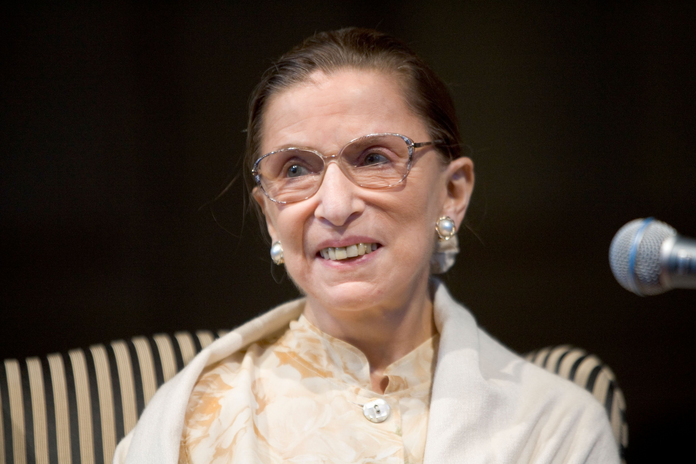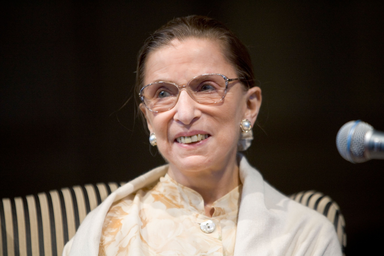“My mother told me to be a lady. And for her, that meant be your own person, be independent.”
Ruth Bader Ginsburg will be remembered not only for being a Supreme Court justice for 27 years, but also for being a feminist icon who fought for women’s rights, LGBTQ+ rights, race issues, and more. She died on September 18, 2020 after battling cancer, leaving a seat open on the Supreme Court and reminding us of all the progress she made in the United States.
Before serving as a Supreme Court justice, Ginsburg earned her bachelor’s degree from Cornell University and later graduated from Columbia Law School at the top of her class. She began her career as a professor at Rutgers University Law School, and later she became the first female professor to earn tenure at Columbia University. Ginsburg also became a co-founder of the Women’s Rights Project with the American Civil Liberties Union in the 1970s, which marked the beginning of her long career as an advocate for women’s equality.
One of the first cases Ginsburg worked on in partner with the Women’s Rights Project was Reed v. Reed in 1971, and she was successful in proving to the Supreme Court that the 14th Amendment bans discrimination on the basis of sex. The case marked Ginsburg’s long fight for equality. According to Anthony D. Romero, the executive director at ACLU, RBG worked on over 30 cases during her time as an ACLU lawyer, and won five of the six cases she personally presented to the Supreme Court.
In 1980, she was appointed by President Jimmy Carter to the United States Court of Appeals, and 13 years later, Ginsburg was appointed by President Bill Clinton to the Supreme Court in June of 1993, making her the second woman to ever hold a spot on the highest bench in America. As a justice of the High Court, Ginsburg worked on some of the most memorable cases in the United States including Bush v. Gore in 2000.
In 2007, RBG fought again against gender discrimination in Ledbetter v. Goodyear Tire & Rubber Company when a young woman named Lilly Ledbetter sued Goodyear for discrimination because her male co-workers were getting paid more. Although the Supreme Court voted in favor of Goodyear, Ginsburg fought to close the gender wage gap.
Ginsburg also voted in favor of legalizing same-sex marriage across the country in Obergefell v. Hodges in 2015. Before this case, she was an officiant at same-sex weddings, so her vote did not come as a surprise.
One of RBG’s most famous decisions was in Whole Woman’s Health v. Hellerstedt in 2015 when she voted that Texas’ abortion bill, which would place restrictions on a woman’s right to an abortion, was unconstitutional. She and the court majority voted to uphold Roe v. Wade, the case that granted women the right to an abortion.
“My idea of how choice should have developed was not a privacy notion, not a doctor’s right notion, but a woman’s right to control her own destiny, to be able to make choices without a big brother state telling her what she can and cannot do,” Ginsburg said about the possibility of overturning Roe v. Wade in an interview with Literary Hub.
There are many more reasons why we should be thanking Ginsburg for her work as a justice and a feminist. Because of her, women are able to hold a credit card or apply for a loan in their own name and widowers can get the same Social Security benefits as women. Many of the cases she is remembered for have to do with discrimination against women, racial minorities, or the LGBTQ+ community.
According to BBC News, Ginsburg is the first woman to lie in state in the U.S. Capitol. She was also the first Supreme Court justice to receive two days of viewing. Thousands of people showed up at the Capitol to pay their respects to Ginsburg.
According to FOX News, the 2018 film On the Basis of Sex and the documentary RBG will be rereleased in select theaters across the country to honor Ginsburg’s legacy. On the Basis of Sex follows Ginburg’s story as a young mother entering the world of law by fighting for women’s equality alongside her husband Martin Ginsburg. RBG details the beginning of Ginsburg’s academic career all the way to the moment she becomes a Supreme Court Justice. The earnings from the rerelease of these movies, both in theaters and on-demand, will go toward the ACLU Women’s Rights Project. Ginsburg’s legacy will live on, and her power will be missed.
“Real change, enduring change, happens one step at a time.” – Ruth Bader Ginsburg, 1933-2020


